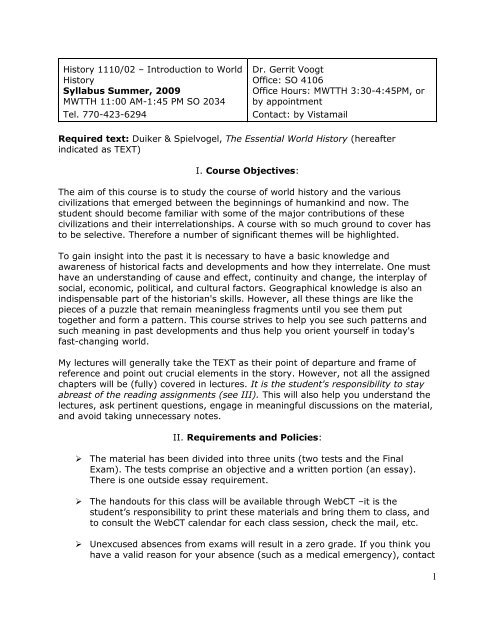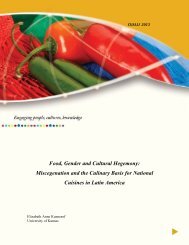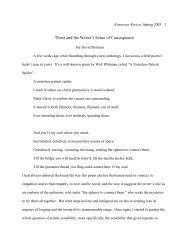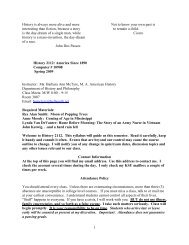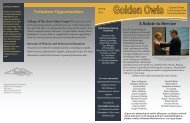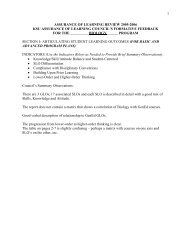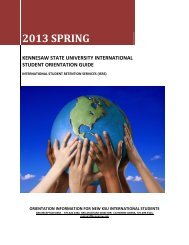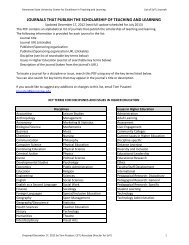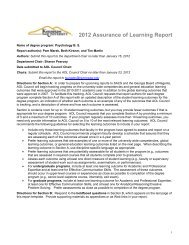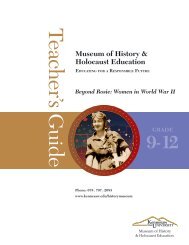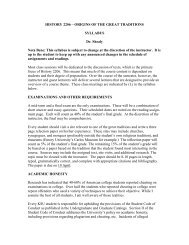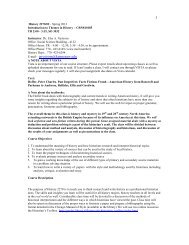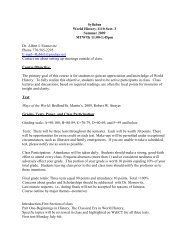Hist 1110 (Intro to World History) - Kennesaw State University
Hist 1110 (Intro to World History) - Kennesaw State University
Hist 1110 (Intro to World History) - Kennesaw State University
Create successful ePaper yourself
Turn your PDF publications into a flip-book with our unique Google optimized e-Paper software.
<strong>Hist</strong>ory <strong>1110</strong>/02 – <strong>Intro</strong>duction <strong>to</strong> <strong>World</strong><br />
<strong>Hist</strong>ory<br />
Syllabus Summer, 2009<br />
MWTTH 11:00 AM-1:45 PM SO 2034<br />
Tel. 770-423-6294<br />
Dr. Gerrit Voogt<br />
Office: SO 4106<br />
Office Hours: MWTTH 3:30-4:45PM, or<br />
by appointment<br />
Contact: by Vistamail<br />
Required text: Duiker & Spielvogel, The Essential <strong>World</strong> <strong>Hist</strong>ory (hereafter<br />
indicated as TEXT)<br />
I. Course Objectives:<br />
The aim of this course is <strong>to</strong> study the course of world his<strong>to</strong>ry and the various<br />
civilizations that emerged between the beginnings of humankind and now. The<br />
student should become familiar with some of the major contributions of these<br />
civilizations and their interrelationships. A course with so much ground <strong>to</strong> cover has<br />
<strong>to</strong> be selective. Therefore a number of significant themes will be highlighted.<br />
To gain insight in<strong>to</strong> the past it is necessary <strong>to</strong> have a basic knowledge and<br />
awareness of his<strong>to</strong>rical facts and developments and how they interrelate. One must<br />
have an understanding of cause and effect, continuity and change, the interplay of<br />
social, economic, political, and cultural fac<strong>to</strong>rs. Geographical knowledge is also an<br />
indispensable part of the his<strong>to</strong>rian's skills. However, all these things are like the<br />
pieces of a puzzle that remain meaningless fragments until you see them put<br />
<strong>to</strong>gether and form a pattern. This course strives <strong>to</strong> help you see such patterns and<br />
such meaning in past developments and thus help you orient yourself in <strong>to</strong>day's<br />
fast-changing world.<br />
My lectures will generally take the TEXT as their point of departure and frame of<br />
reference and point out crucial elements in the s<strong>to</strong>ry. However, not all the assigned<br />
chapters will be (fully) covered in lectures. It is the student's responsibility <strong>to</strong> stay<br />
abreast of the reading assignments (see III). This will also help you understand the<br />
lectures, ask pertinent questions, engage in meaningful discussions on the material,<br />
and avoid taking unnecessary notes.<br />
II. Requirements and Policies:<br />
‣ The material has been divided in<strong>to</strong> three units (two tests and the Final<br />
Exam). The tests comprise an objective and a written portion (an essay).<br />
There is one outside essay requirement.<br />
‣ The handouts for this class will be available through WebCT –it is the<br />
student’s responsibility <strong>to</strong> print these materials and bring them <strong>to</strong> class, and<br />
<strong>to</strong> consult the WebCT calendar for each class session, check the mail, etc.<br />
‣ Unexcused absences from exams will result in a zero grade. If you think you<br />
have a valid reason for your absence (such as a medical emergency), contact<br />
1
me before or on the day of the test, and submit proper documentation;<br />
excuses after the test date will not be accepted.<br />
‣ Arrive promptly; if you have <strong>to</strong> leave early, tell the instruc<strong>to</strong>r at the<br />
beginning of class. CELL PHONES MUST BE TURNED OFF DURING CLASS.<br />
Don’t annoy the class and embarrass yourself!<br />
‣ Academic integrity: Every KSU-student is responsible for upholding the<br />
provisions of the Student Code of Conduct, as published in the<br />
Undergraduate and Graduate Catalogs. Section II of the Student Code of<br />
Conduct addresses the <strong>University</strong>’s policy on academic honesty, including<br />
provisions regarding plagiarism and cheating, unauthorized access <strong>to</strong><br />
<strong>University</strong> materials, misrepresentation/ falsification of <strong>University</strong> records or<br />
academic work, malicious removal, retention, or destruction of library<br />
materials, malicious/intentional misuse of computer facilities and/or services,<br />
and misuse of student identification cards. Incidents of alleged academic<br />
misconduct will be handled through the established procedures of the<br />
<strong>University</strong> Judiciary Program, which includes either an “informal” resolution<br />
by a faculty member, resulting in a grade adjustment, or a formal hearing<br />
procedure, which may subject a student <strong>to</strong> the Code of Conduct’s minimum<br />
one semester suspension requirement.<br />
‣ Grading is as follows: Test 1 =20%<br />
Test 2 =20%<br />
Essay =20%<br />
Final =30%<br />
Participation =10%<br />
‣ The participation grade is based on class attendance and preparedness (as<br />
established through the occasional impromptu quizzes on the readings).<br />
‣ Thursday, June 11, is the last day you can withdraw from this course and still<br />
receive a "W". You must officially withdraw at the Registrar's.<br />
III. Course Outline and Reading Assignments:<br />
Attn.: These dates are tentative; they are meant <strong>to</strong> help you structure<br />
your reading and prepare for class. The student is expected <strong>to</strong> keep up<br />
with possible changes announced during class, via WebCT, or in the Study<br />
Guides.<br />
COURSE OUTLINE:<br />
TH May 28 <strong>Intro</strong>duction; river valley civilizations; India: caste and spirituality;<br />
TEXT chs. 1 & 2 (pp. 4-50)<br />
M June 1 China: genesis of a Confucian state TEXT ch. 3 (pp. 51-73)<br />
2
T June 2 Greco-Roman civilization TEXT chs. 4 & 5 (pp. 74-121)<br />
W June 3 Rise of the ummah: Islam; Review for Test 1 TEXT ch. 7 (pp. 145-<br />
168)<br />
TH June 4<br />
M June 8<br />
TEST 1; The Pre-Columbian Americas<br />
Tang and Sung China; Medieval Europe; the Mongol Onslaught<br />
TEXT chs. 10 and 12 (pp. 215-237; 259-262)<br />
T June 9 High Middle Ages and Renaissance in Europe; Global Balance c.<br />
1500; European Explorations and Expansion TEXT chs. 12 and 13<br />
(pp. 263-310)<br />
W June 10 The Realm of Islam Ch. 15 (pp. 333-354)<br />
TH June 11 East Asia; Japan opened and closed; review for test 2 TEXT Ch. 16<br />
(pp. 355-373) [Last day <strong>to</strong> withdraw w/o academic penalty]<br />
M June 15<br />
T June 16<br />
W June 17<br />
TH June 18<br />
TEST 2; Europe: Reformation and Enlightenment<br />
The Dual Revolution in Europe; Nationalism and the nation state<br />
(19 th century) TEXT chs. 14 & 17 (pp. 311-328; 377-400)<br />
Africa and the New Imperialism; China and Japan: Different<br />
responses <strong>to</strong> New Imperialism TEXT chs. 20 and 21 (pp. 446-489)<br />
Global Imbalance c. 1900; <strong>World</strong> War and Russian Revolution TEXT<br />
ch. 22 (pp. 490-505)<br />
M June 22 Interbellum Years and another <strong>World</strong> War TEXT ch. 22 (pp. 505-<br />
511); ch. 24 (pp. 535-559)<br />
T June 23 After 1945; Decolonization and a Cold War TEXT Ch. 23 (pp. 512-<br />
520); chs. 25 and 26 (pp. 562-592)<br />
W June 24<br />
Arab-Israeli Conflict; 9/11 and after; Conclusions. Review for Final.<br />
TH June 25<br />
FINAL EXAM 11:00 AM-1:00 PM<br />
3


